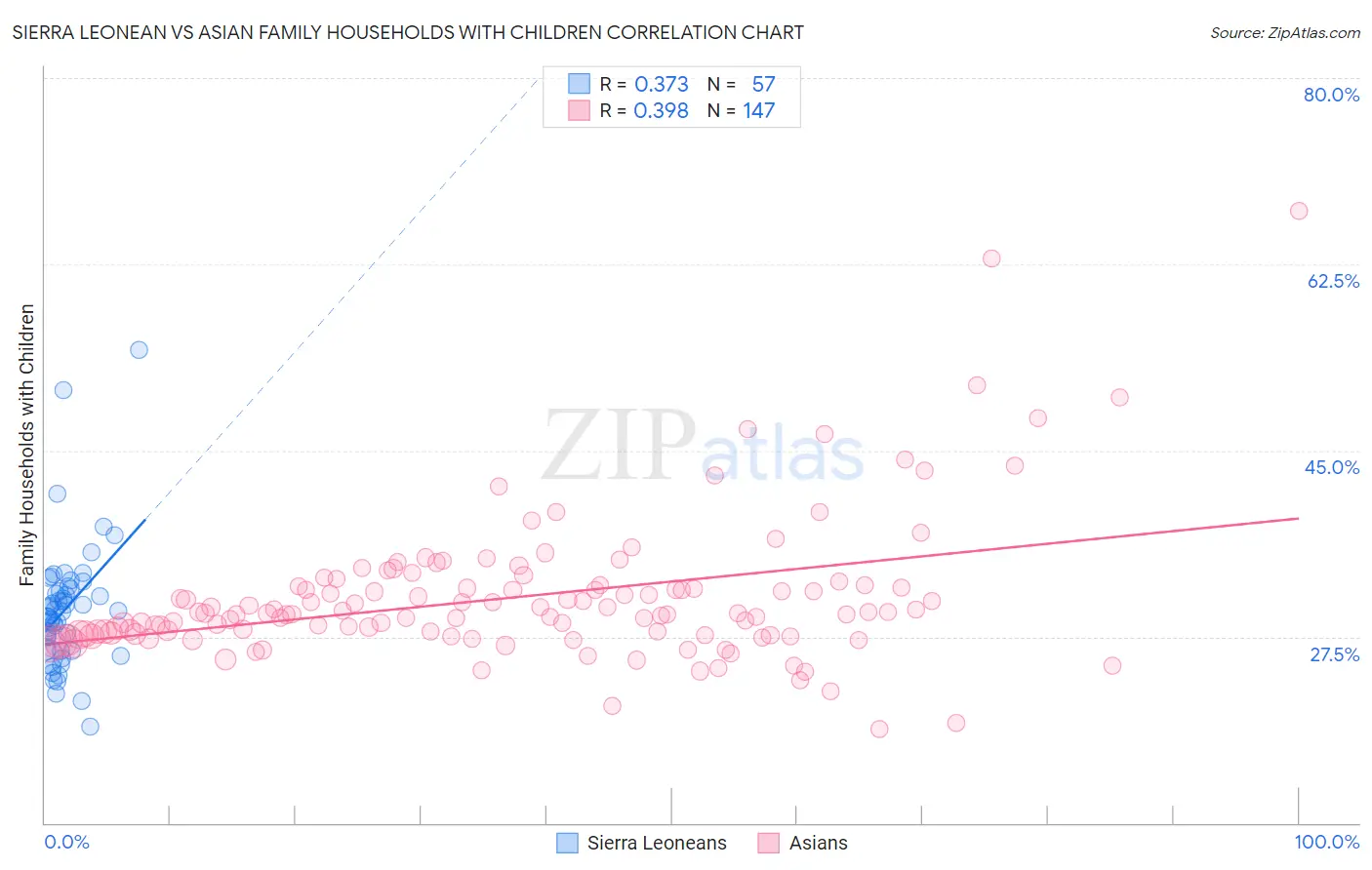Sierra Leonean vs Asian Family Households with Children
COMPARE
Sierra Leonean
Asian
Family Households with Children
Family Households with Children Comparison
Sierra Leoneans
Asians
28.9%
FAMILY HOUSEHOLDS WITH CHILDREN
100.0/ 100
METRIC RATING
54th/ 347
METRIC RANK
29.1%
FAMILY HOUSEHOLDS WITH CHILDREN
100.0/ 100
METRIC RATING
43rd/ 347
METRIC RANK
Sierra Leonean vs Asian Family Households with Children Correlation Chart
The statistical analysis conducted on geographies consisting of 83,331,098 people shows a mild positive correlation between the proportion of Sierra Leoneans and percentage of family households with children in the United States with a correlation coefficient (R) of 0.373 and weighted average of 28.9%. Similarly, the statistical analysis conducted on geographies consisting of 549,945,498 people shows a mild positive correlation between the proportion of Asians and percentage of family households with children in the United States with a correlation coefficient (R) of 0.398 and weighted average of 29.1%, a difference of 0.68%.

Family Households with Children Correlation Summary
| Measurement | Sierra Leonean | Asian |
| Minimum | 19.1% | 18.8% |
| Maximum | 54.4% | 67.5% |
| Range | 35.3% | 48.7% |
| Mean | 30.1% | 31.2% |
| Median | 29.9% | 29.7% |
| Interquartile 25% (IQ1) | 26.2% | 27.7% |
| Interquartile 75% (IQ3) | 32.1% | 32.2% |
| Interquartile Range (IQR) | 5.9% | 4.5% |
| Standard Deviation (Sample) | 5.9% | 6.7% |
| Standard Deviation (Population) | 5.9% | 6.7% |
Demographics Similar to Sierra Leoneans and Asians by Family Households with Children
In terms of family households with children, the demographic groups most similar to Sierra Leoneans are Immigrants from Asia (28.8%, a difference of 0.060%), Immigrants from Cambodia (28.9%, a difference of 0.080%), Immigrants from Guatemala (28.8%, a difference of 0.14%), Guatemalan (28.9%, a difference of 0.15%), and Immigrants from Peru (28.9%, a difference of 0.23%). Similarly, the demographic groups most similar to Asians are Immigrants from Taiwan (29.0%, a difference of 0.040%), Fijian (29.0%, a difference of 0.10%), Immigrants from Philippines (29.0%, a difference of 0.18%), Immigrants from South Eastern Asia (29.1%, a difference of 0.19%), and Spanish American Indian (29.1%, a difference of 0.19%).
| Demographics | Rating | Rank | Family Households with Children |
| Koreans | 100.0 /100 | #38 | Exceptional 29.2% |
| Yaqui | 100.0 /100 | #39 | Exceptional 29.1% |
| Central Americans | 100.0 /100 | #40 | Exceptional 29.1% |
| Immigrants | South Eastern Asia | 100.0 /100 | #41 | Exceptional 29.1% |
| Spanish American Indians | 100.0 /100 | #42 | Exceptional 29.1% |
| Asians | 100.0 /100 | #43 | Exceptional 29.1% |
| Immigrants | Taiwan | 100.0 /100 | #44 | Exceptional 29.0% |
| Fijians | 100.0 /100 | #45 | Exceptional 29.0% |
| Immigrants | Philippines | 100.0 /100 | #46 | Exceptional 29.0% |
| Peruvians | 100.0 /100 | #47 | Exceptional 29.0% |
| Apache | 100.0 /100 | #48 | Exceptional 29.0% |
| Jordanians | 100.0 /100 | #49 | Exceptional 29.0% |
| Immigrants | Immigrants | 100.0 /100 | #50 | Exceptional 28.9% |
| Immigrants | Peru | 100.0 /100 | #51 | Exceptional 28.9% |
| Guatemalans | 100.0 /100 | #52 | Exceptional 28.9% |
| Immigrants | Cambodia | 100.0 /100 | #53 | Exceptional 28.9% |
| Sierra Leoneans | 100.0 /100 | #54 | Exceptional 28.9% |
| Immigrants | Asia | 100.0 /100 | #55 | Exceptional 28.8% |
| Immigrants | Guatemala | 100.0 /100 | #56 | Exceptional 28.8% |
| Danes | 100.0 /100 | #57 | Exceptional 28.7% |
| Hawaiians | 100.0 /100 | #58 | Exceptional 28.7% |